News
07.10.2024
National training workshop: Relating language curricula, tests and examinations to the CEFR (RELANG) (23 – 25 September 2024, Tallinn, Estonia)
Local organiser: Kati Bakradze-Pank, Estonian Association of Foreign Language Teachers
ECML experts: Karine Dekeukelaere, Belgium; Gábor Szabo, Hungary
Participants: 23 (language testers and examiners, item writers, teachers and teacher trainers, curriculum developers, language inspectors, policymakers)
“The Relating language curricula, tests and examinations to the Common European Framework of Reference (RELANG) three-day workshop was of high value to language testers and examiners, item writers and curriculum developers, policy makers who are in the middle of rewriting and validating their national examination in relation to the CEFR model of language use. During the workshop, special attention was paid to the principles of CEFR descriptors, item construction by skill, assessment, and rating scales; practical tips, examples, and exercises are useful materials. Local expertise is taken into consideration and parallels drawn between national language exams and the CEFR. The workshop was of high practical value to the local context.”
Kati Bakradze-Pank, local coordinator, 3 October 2024
ECML project website: RELANG, ECML-EC cooperation agreement 2024 "Innovative methodologies and assessment in language learning"
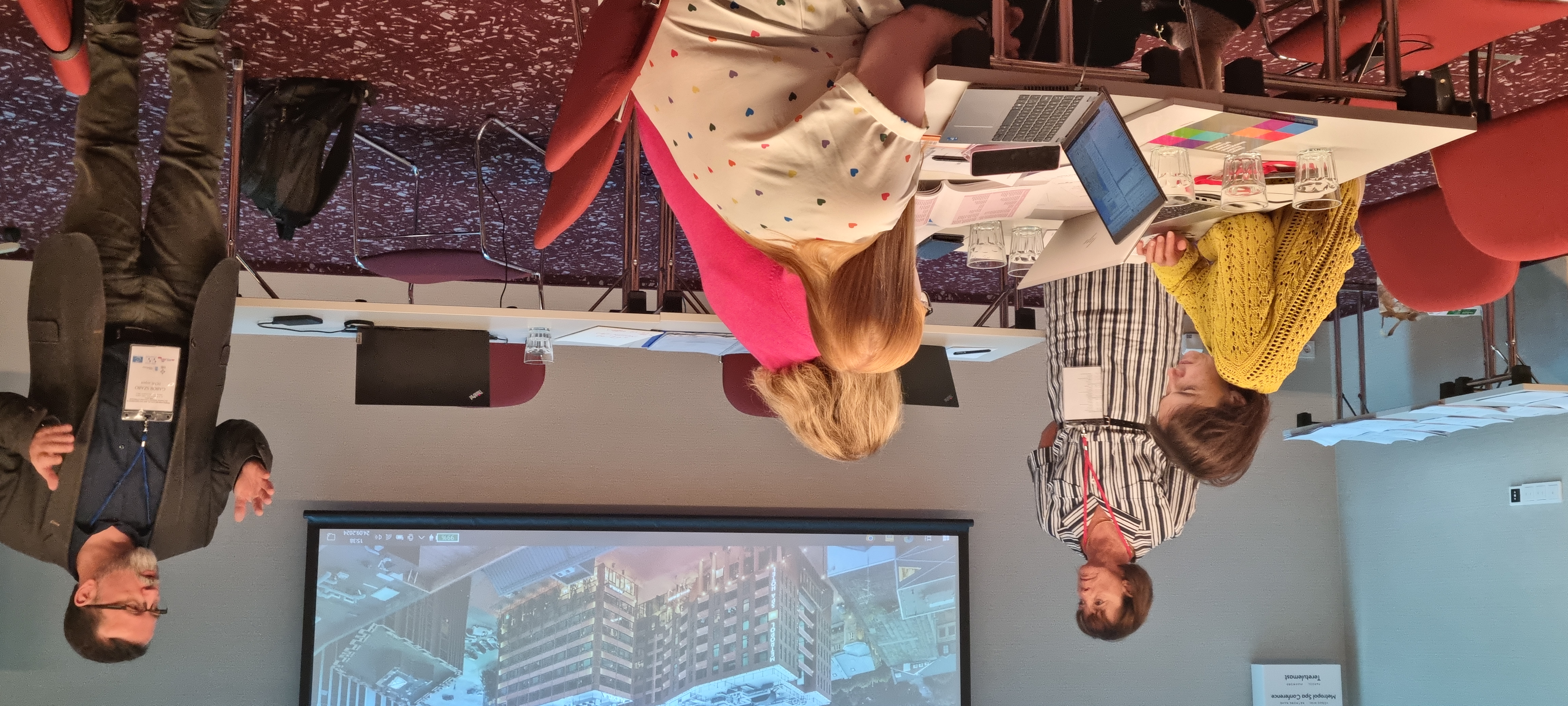
08.07.2024
Empowering integration through language education
Date and venue: 30-31 May 2024, Tallinn, Estonia
Local organiser: Ministry of Culture, Estonia
ECML moderators: Alexander Braddell (United Kingdom) and Matilde Grünhage-Monetti (Germany)
Participants: teachers, and researchers of Estonian as a second language (L2) for adults, Ministry of Culture, Ministry of Education and Research, Ministry of Economic Affairs and Communications, Integration Foundation, The Estonian Unemployment Insurance Fund, The Estonian Employers’ Confederation, employers (including employer associations)
On 30-31 May 2024, the Ministry of Culture, Estonia, in cooperation with the European Centre for Modern Languages (ECML), hosted a seminar entitled “Language education for labour market integration”. The event, held at Roosikrants Residence, Tallinn, brought together 34 participants, including representatives from various ministries, language companies, and integration foundations. Expert moderators Matilde Grünhage-Monetti and Alexander Braddell shared insights and best practices from across Europe, focusing on enhancing work-related language skills for adult migrants and ethnic minorities.
The seminar emphasized the importance of flexible, needs-based language learning, collaboration with employers, and the development of digital learning tools. Positive feedback from participants highlighted the seminar's relevance and effectiveness. This initiative is a step towards creating a coherent and sustainable system for language education, aiding the integration of non-native speakers into the Estonian labour market and society. Future activities will continue to build on the strategies and commitments developed during the seminar.
Author: Ministry of Culture, Estonia
Estonian version:
Piiratud ressursside tingimustes tuleb otsida alternatiivseid lahendusi keeleõppe pakkumisel. Näiteks arendades digitaalseid õppevõimalusi ja otsides koostöövõimalusi tööandjatega.
30.05-31.05.24 toimus Kultuuriministeeriumi toel ja Euroopa Nõukogu kaasrahastusel keeleõppe seminar, kus Euroopa Nüüdiskeelte Keskuse eksperdid Matilde Grünhage-Monetti ja Alexander Braddell jagasid osalejatele teadmisi ja kogemusi ning tutvustasid teiste riikide parimaid praktikaid.
Kahe päeva jooksul otsisime vastuseid peamisele küsimusele – kuidas aidata täiskasvanud sisserändajatel arendada tööalast keeleoskust?
Seminarist võtsid lisaks tööandjatele veel osa ka Kultuuriministeeriumi, Majandus- ja Kommunikatsiooniministeeriumi ning Haridus- ja Teadusministeeriumi ametnikud, keelefirmad, Eesti Integratsiooni Sihtasutus ning Eesti Töötukassa.
Source: www.linkedin.com/feed/update/urn:li:ugcPost:7203388268317519873/
Ministry of Culture, Estonia
Related links
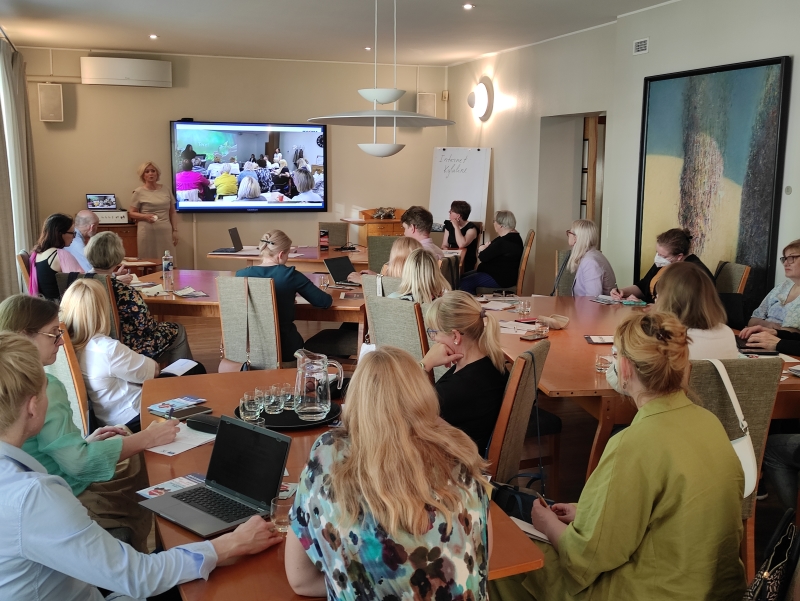
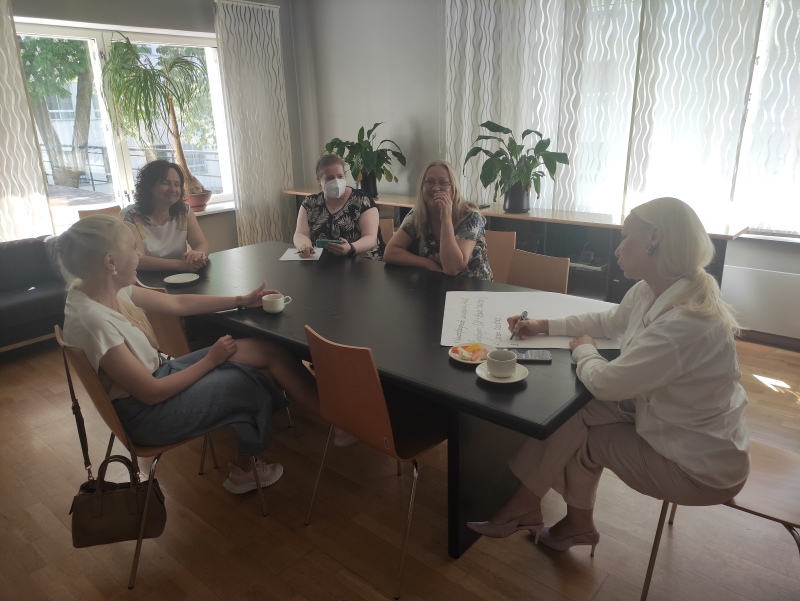
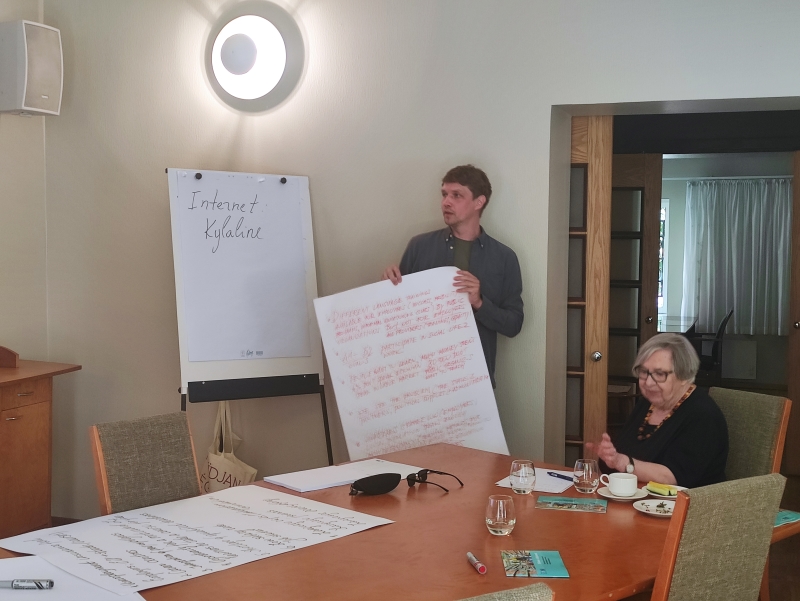
05.07.2024
“CLIL and beyond, a pluriliteracies approach – Teaching for deeper learning”
Date and venue: 16-17 May 2024, Tallinn, Estonia
Local organiser: Kati Bakradze-Pank
ECML moderators: Kevin Schuck (Netherlands) and Susanne Staschen-Dielmann (Germany)
Participants: 22 trainers, teachers in kindergarten, primary, upper- and lower-secondary, university, adult education, integrated vocational and secondary education, newcomers in school levels
The “CLIL and beyond, a Pluriliteracies Approach – Teaching for Deeper Learning” training targeted practicing teachers and teacher trainers who were interested in supporting schools and other teachers in implementing CLIL in general education, vocational education, and nonformal studies. The teachers participating had a background in implementing CLIL but required a more comprehensive and in-depth approach, in order to meet the current educational challenges in Estonia. Every teacher is a language teacher, and this means that CLIL has to become an integral and natural part of teaching in any subject or profession to students coming from pluricultural and plurilingual backgrounds in the current transitional period of Estonian-language education in Estonia.
The practical approaches presented during the workshop by the ECML experts Susanne Staschen-Dielmann and Kevin Schuck addressed the needs of practitioners, trainers, teachers at kindergarten, primary, upper- and lower-secondary, university, adult education, integrated vocational and secondary education and newcomers in school levels attending the workshop.
The primary objective of this workshop in Estonia was to learn more about the various approaches and methods used in this important area. Both practical and theoretical aspects were discussed, ultimately benefiting not only learners in the classrooms but also the teachers themselves who cooperated with one another and shared their experiences.
Kati Bakradze-Pank
Estonian version
Kursus "Lõimitud aine- ja keeleõppe ja mitmekeelsus - õpetamine sügavama õppimise eesmärgil" oli kursus praktiseerivatele õpetajatele ja õpetajakoolitajatele, kes olid huvitatud koolide ja teiste õpetajate toetamisest lõimitud aine- ja keeleõppe rakendamisest üldhariduses, kutsehariduses ja mitteformaalses õppes. Osalevad õpetajad oli LAK-õppe rakendamise taustaga, kuid Eesti praeguste haridusprobleemide lahendamiseks oli vaja terviklikumat ja põhjalikumat lähenemist. Iga õpetaja on keeleõpetaja ja see tähendab, et LAK-õpe peab saama lahutamatuks ja loomulikuks osaks mistahes aine- või kutsehariduse andmisel mitmekultuurilise ja mitmekeelse taustaga õpilastele praegusel üleminekuperioodil eestikeelsele haridusele Eestis.
Praktilised lähenemised, mida Euroopa Nüüdiskeelte Keskuse eksperdid dr Susanne Staschen-Dielmann ja Kevin Schuck töötoas käsitlesid, vastasid praktikute, koolitajate, lasteaia-, alg-, põhi- ja keskkooli-, ülikooli-, täiskasvanuhariduse, integreeritud kutse- ja keskhariduse õpetajate vajadustele.
Meie kontekstis oli seminari esmane eesmärk rohkem teada saada erinevate lähenemisviisidest ja meetoditest, kus arutati nii praktilisi kui ka teoreetilisi aspekte, millest said kasu mitte ainult õppijad klassiruumis, vaid ka õpetajad ise koostöös oma kogemusi jagades.
Kati Bakradze-Pank
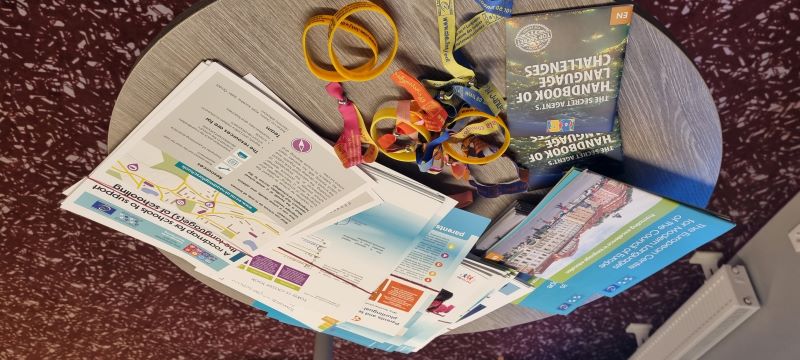
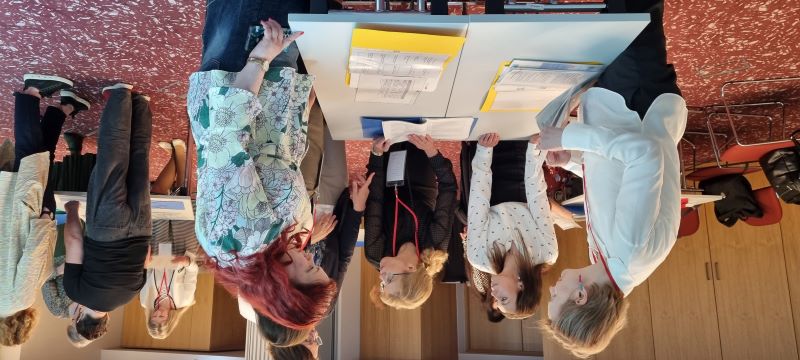
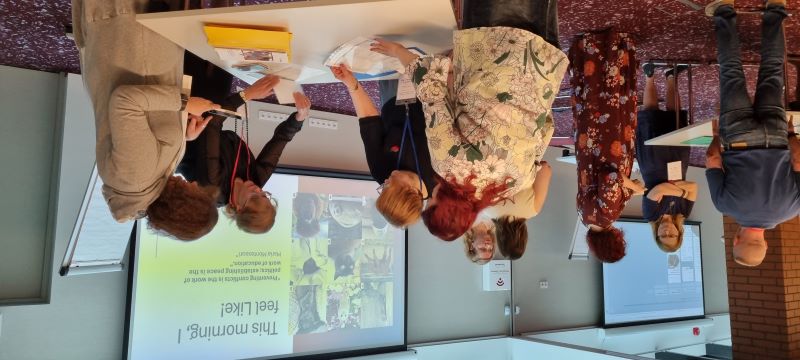
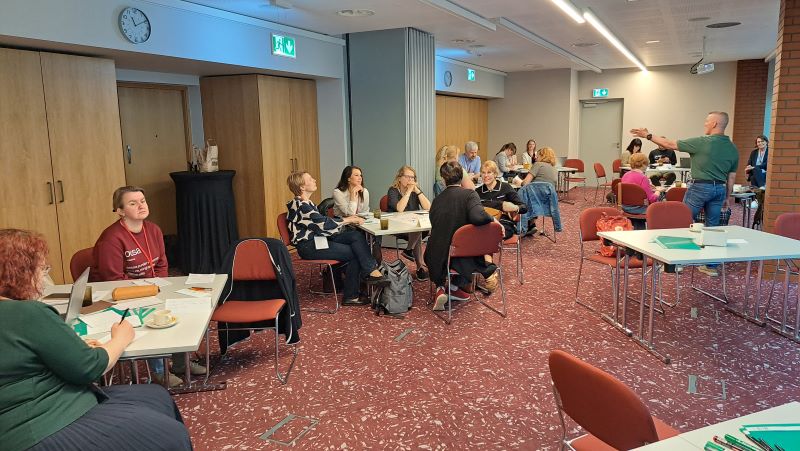
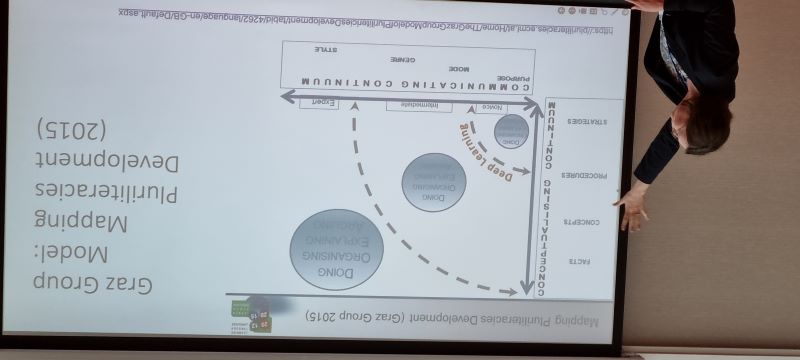
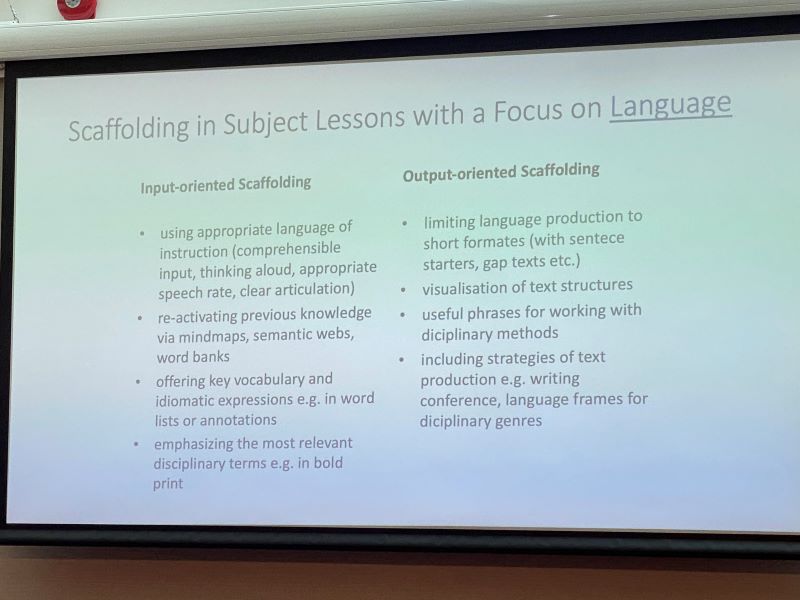
25.10.2022
Setting up learning environments where modern languages flourish: ECML training workshop (Tallinn, 22-23 September 2022)
Local organiser: Kati Bakradze, Estonian Foreign Language Teachers Association
ECML experts: Jonas Erin (France) and SIlvia Minardi (Italy)
Participants: 46 foreign language teachers, language experts from the Ministry of Education and Research in Estonia, headmasters, head teachers, experts from universities
“EOL – Learning environments where modern languages flourish” is a perfect workshop for schools and school teams who are working to tailor inspiring and inclusive language learning programs and settings for the learners. The workshop takes a holistic approach to the learner and a diversifying approach to the school’s linguistic landscape. During the two-day workshop in Tallinn, Estonia, participants from schools and other language experts discussed how to make schools more language friendly in a systematic manner, taking into account the learner, the class, the school and the system. This approach helps identify gaps in current offers as well as to distribute responsibilities and tasks to different stakeholders in a practical and actionable manner. The experts conducting the training event link the content to the specific setting and proceed from the participants’ contexts and the challenges that they have identified. Together with great examples from across Europe, this makes for an excellent event that can inspire and motivate teachers and school teams to improve language learning and teaching for their students.
Authors: Kati Bakradze, Pille Põikli
Estonian version
Koolitus „EOL – learning enivornments where modern languages flourish“ on suurepärane koolitus koolidele ja koolimeeskondadele, kes soovivad arendada enda konteksti sobivaid inspireerivaid ja kaasavaid keeleõppekeskkondi. Koolitusel vaadatakse keeleõppele kui tervikule ja arutletakse selle üle, kuidas mitmekesistada koolide keelelist maastikku. Tallinnas toimunud kahepäevasel koolitusel osalesid nii koolide esindajad kui ka teised keelevaldkonna eksperdid. Koos arutati, kuidas muuta koole keelesõbralikumaks, arvestades nii õppija, klassi, kooli kui ka kogu süsteemi tasandit. Süsteemse lähenemise abil saab tuvastada olemasoleva korralduse kitsaskohad ja jagada vastutuse ja ülesanded, et astuda konkreetseid samme eesmärkide saavutamiseks. Euroopa Nüüdiskeelte Keskuse koolitajad sidusid koolituse sisu oskuslikult kohaliku konteksti ja osalejate vajadustega, toetudes neilt eelnevalt kogutud infole. Lisaks tõid nad endaga kaasa laia teadmise teistest Euroopa riikidest, luues nii motiveeriva sündmuse, mis aitab koolimeeskondadel arendada õppijatele pakutavat keeleõpet.
Photo gallery
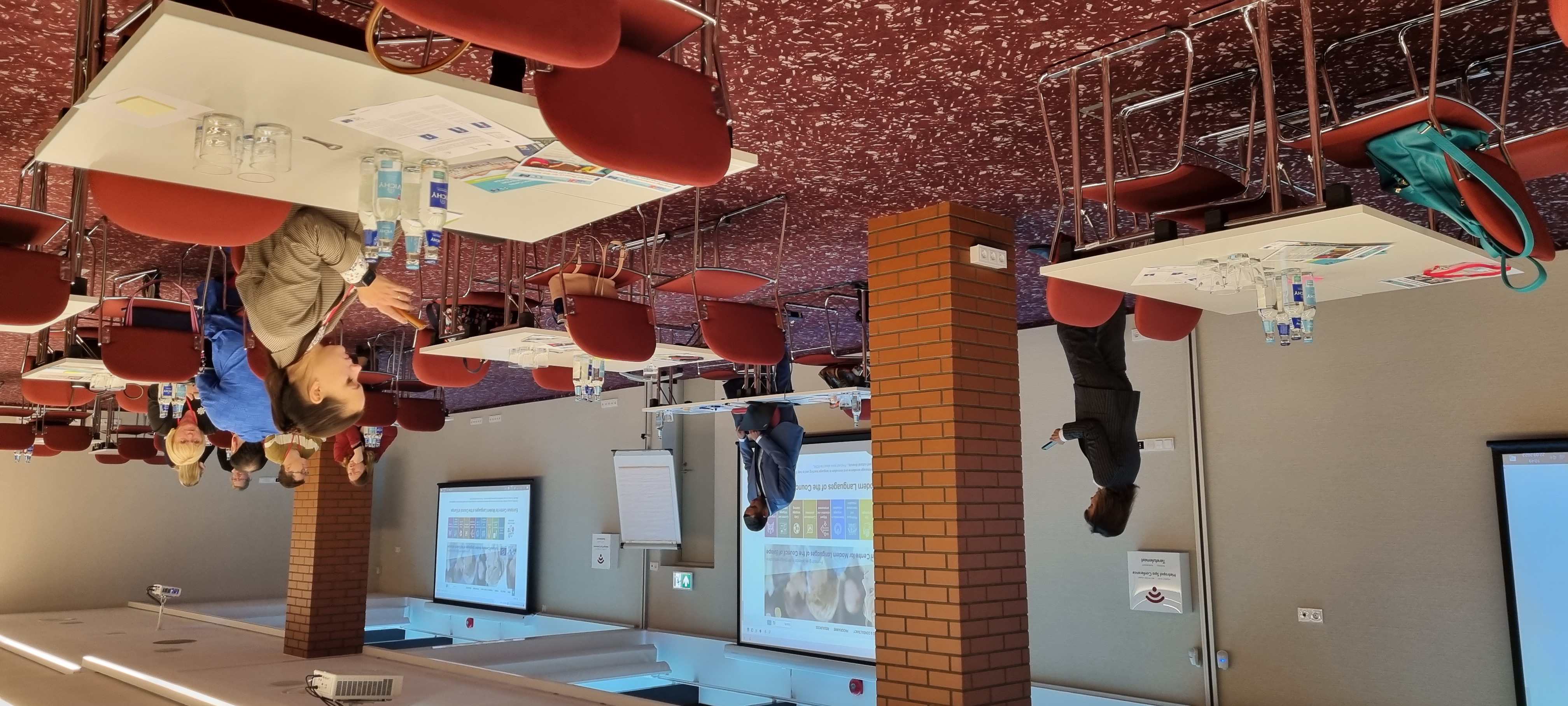
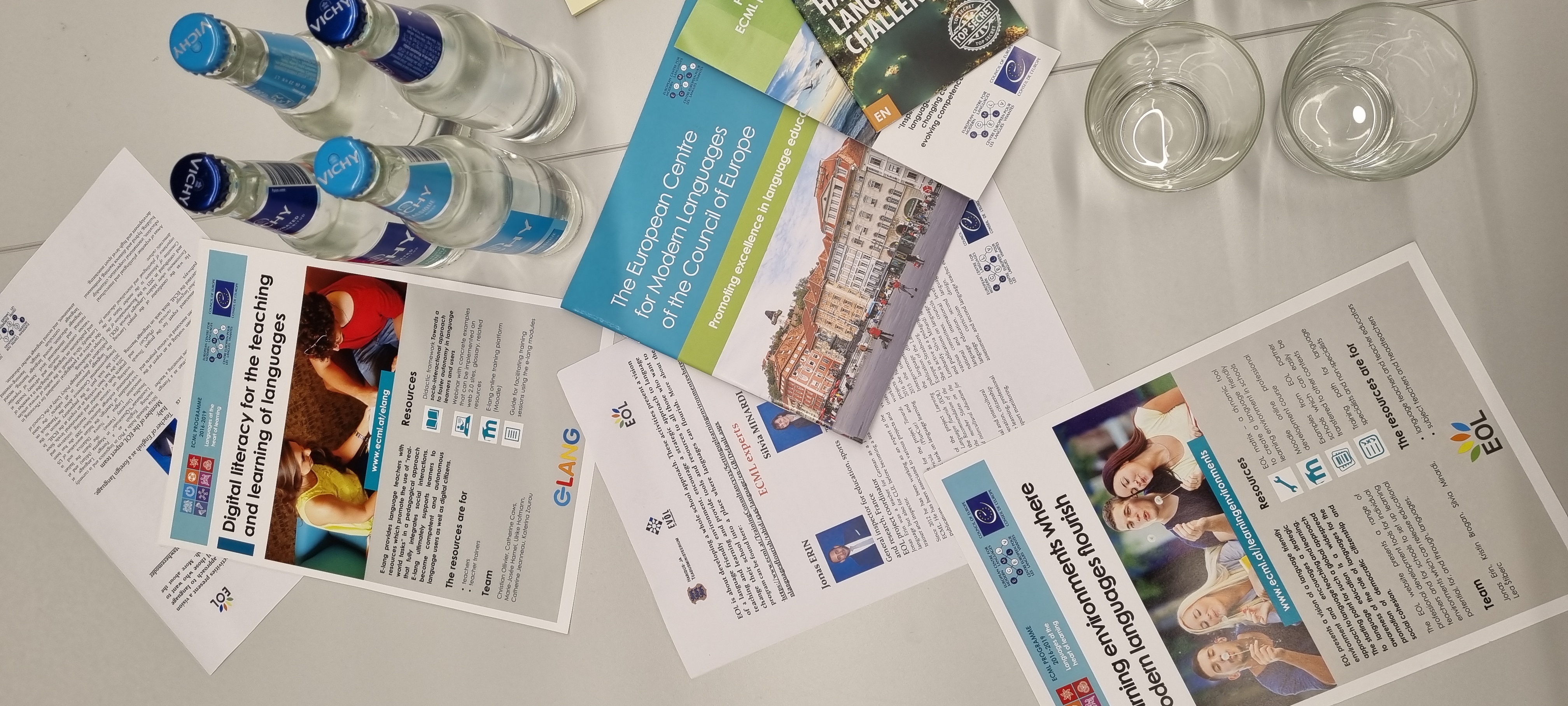
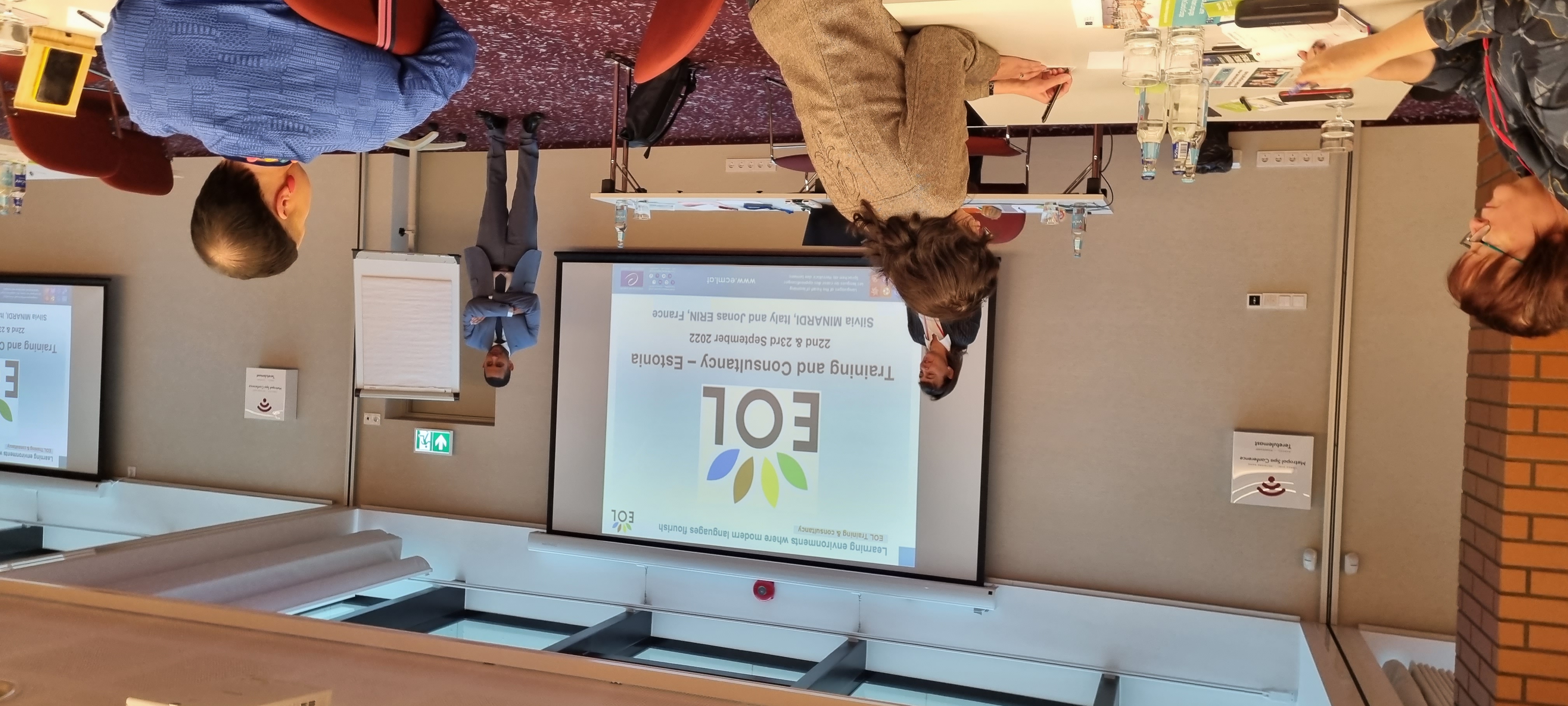
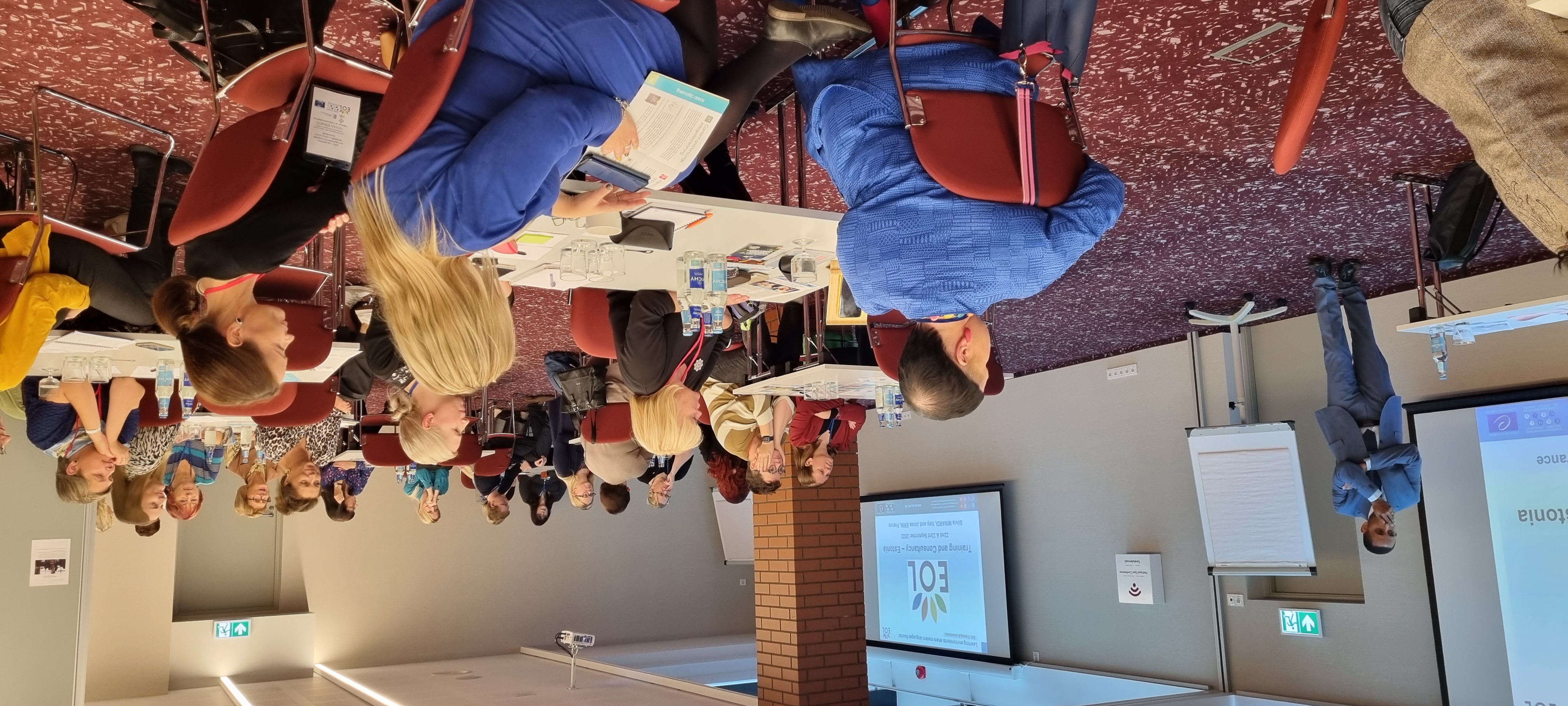
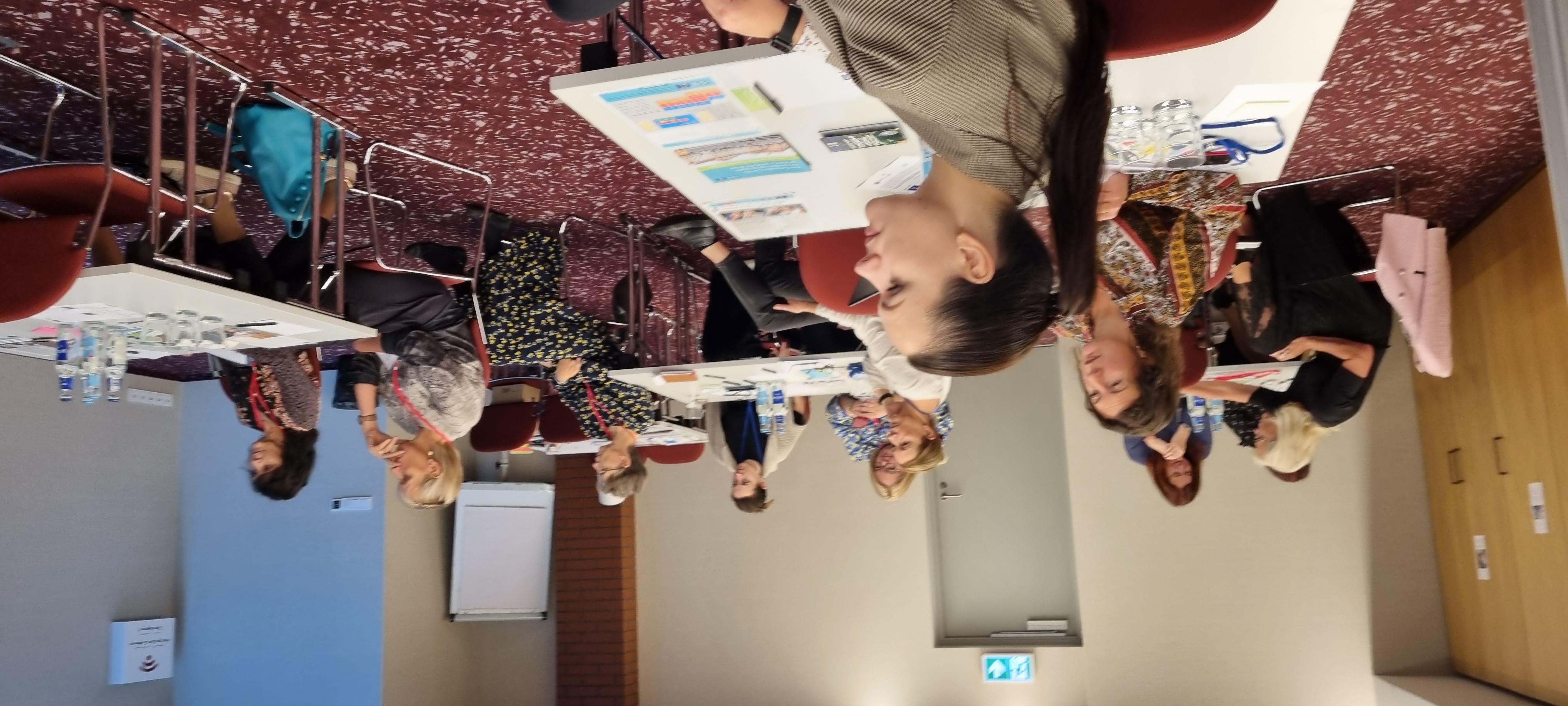
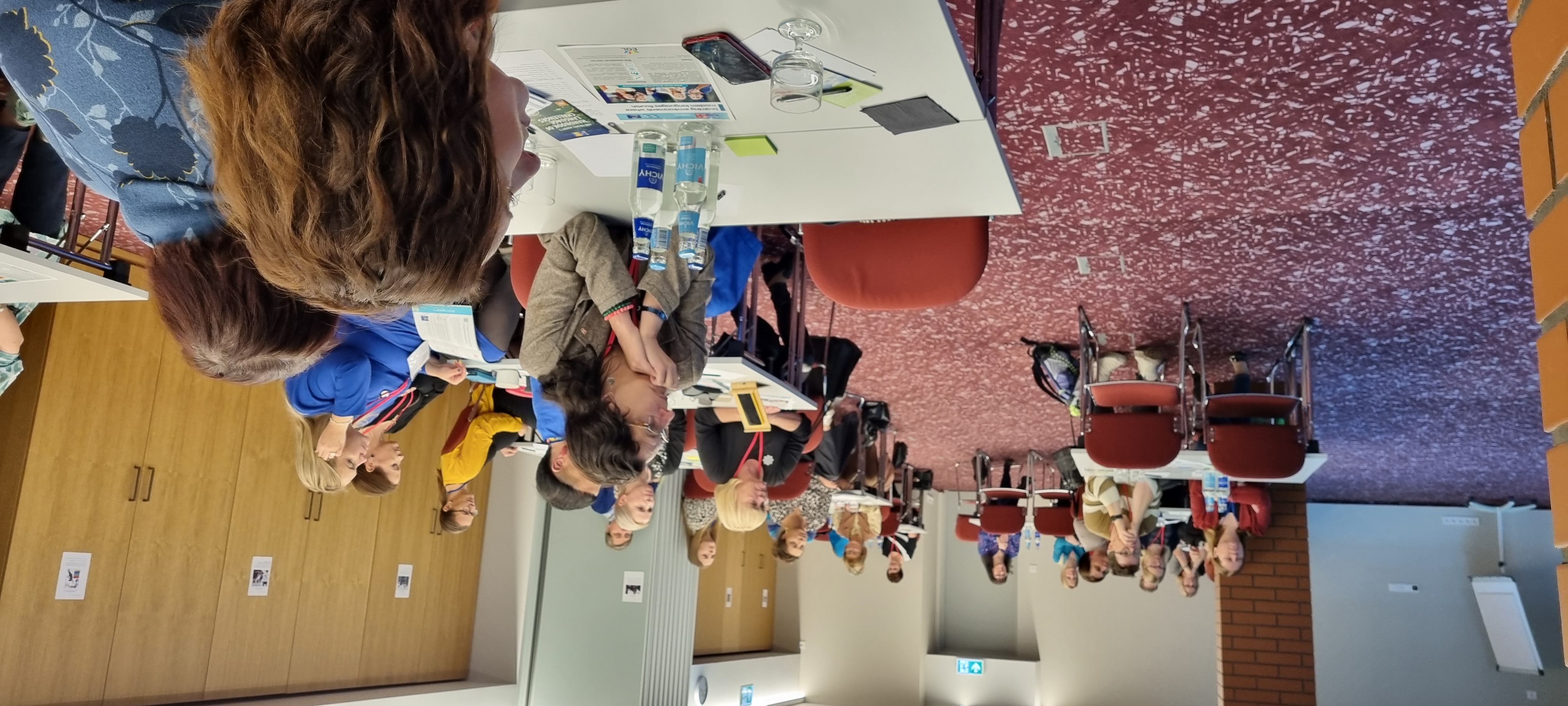
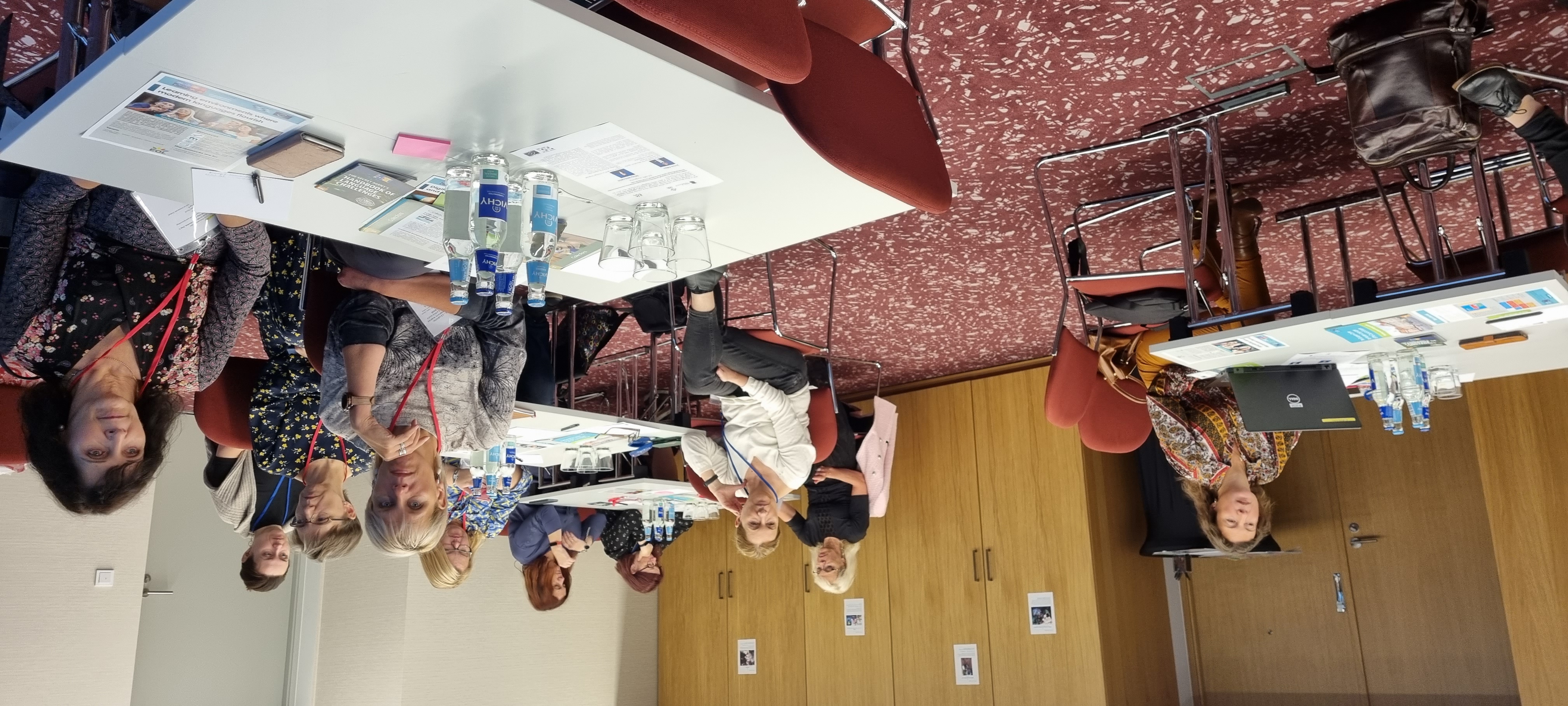
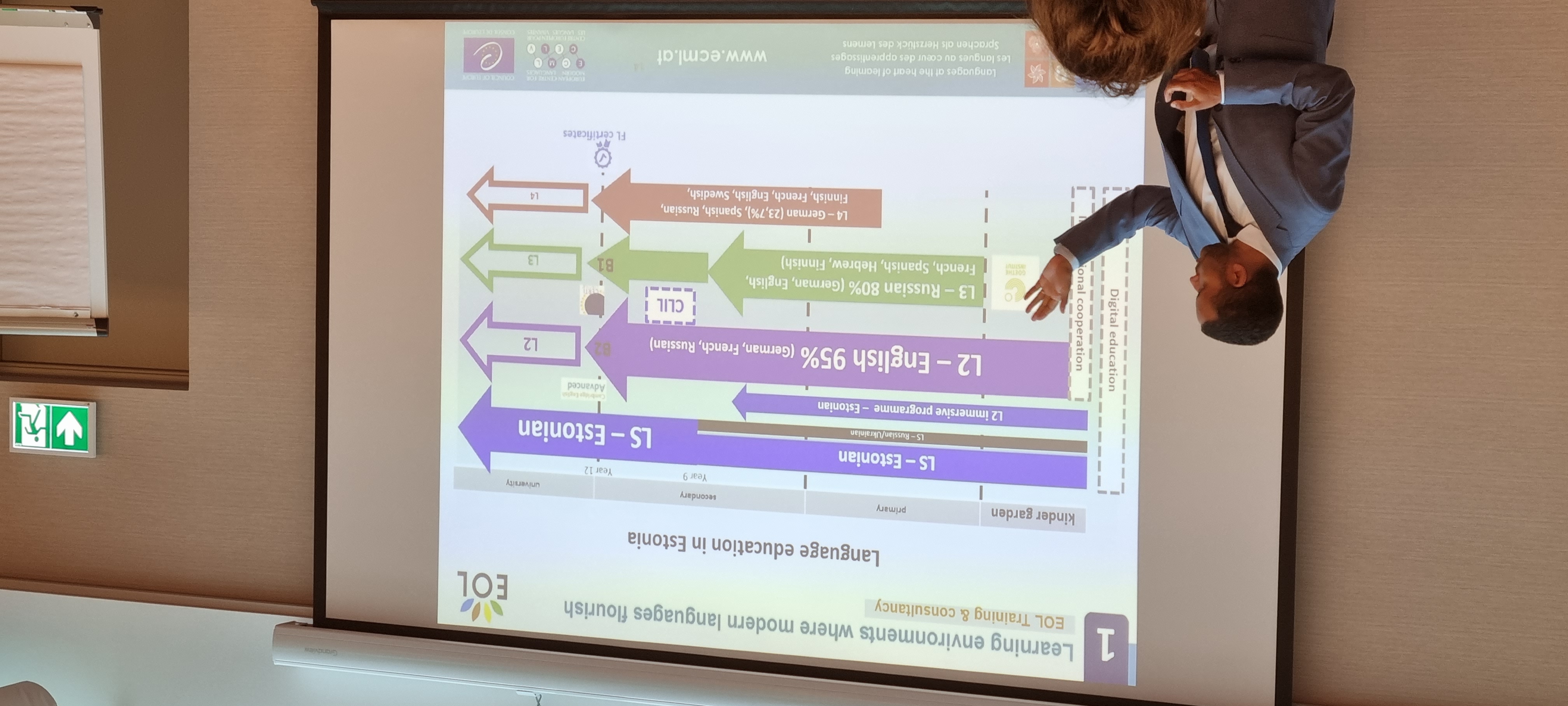
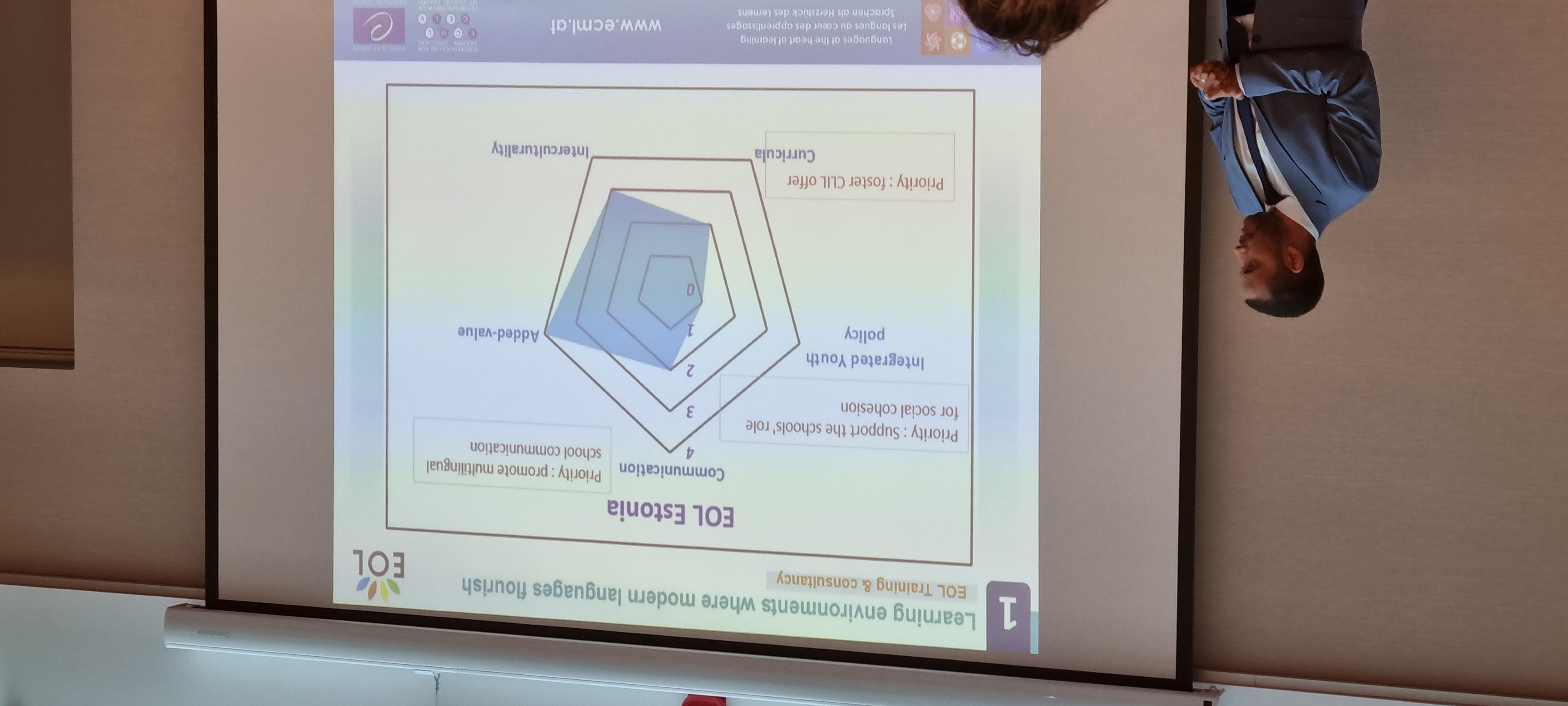
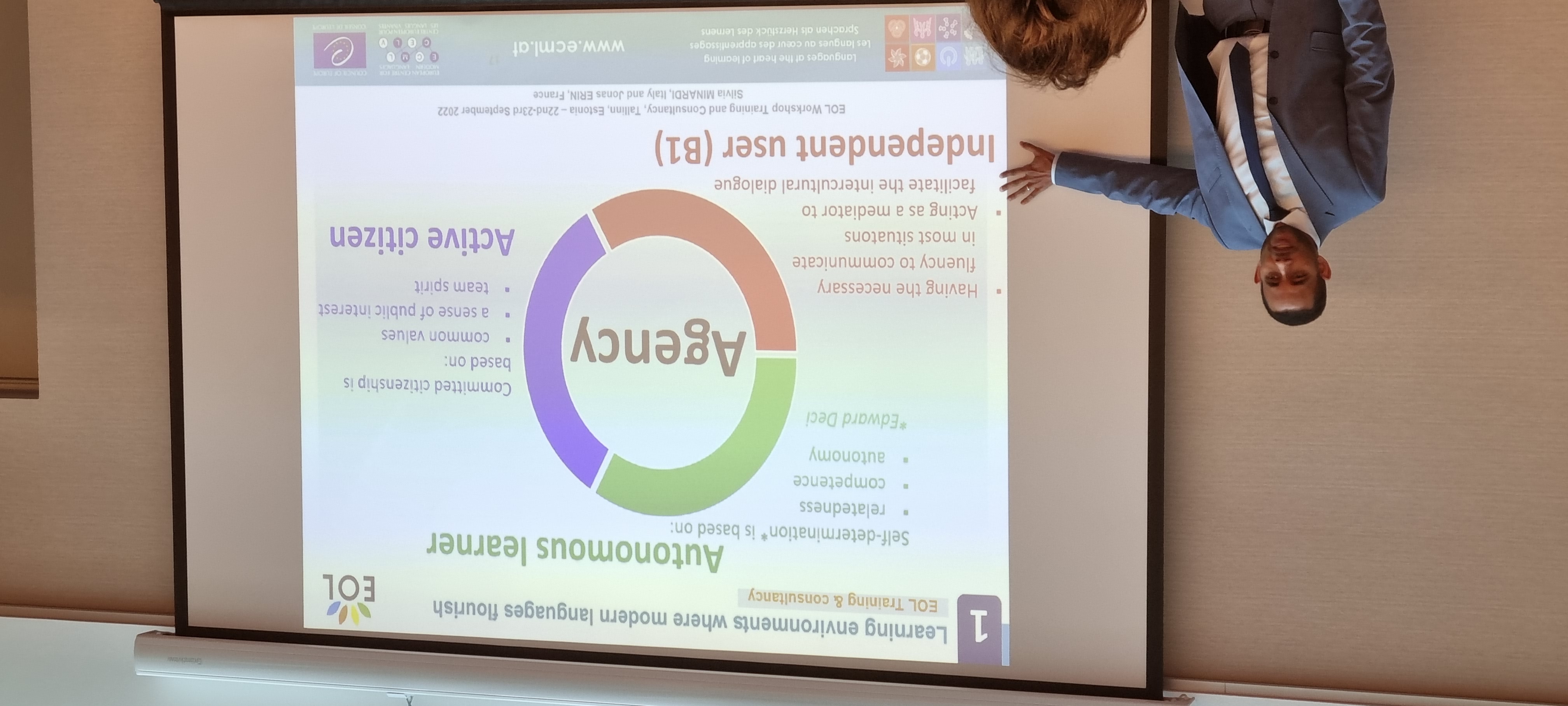
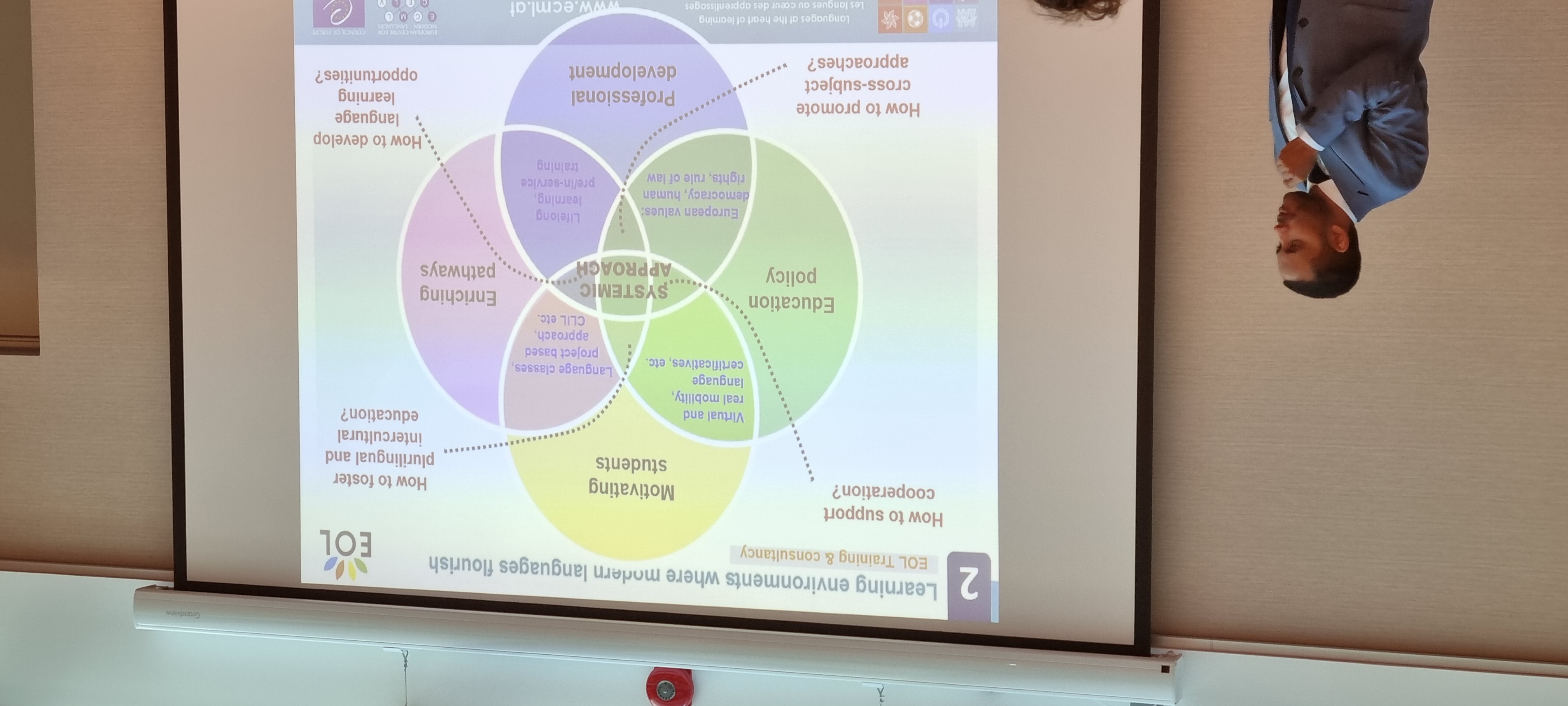
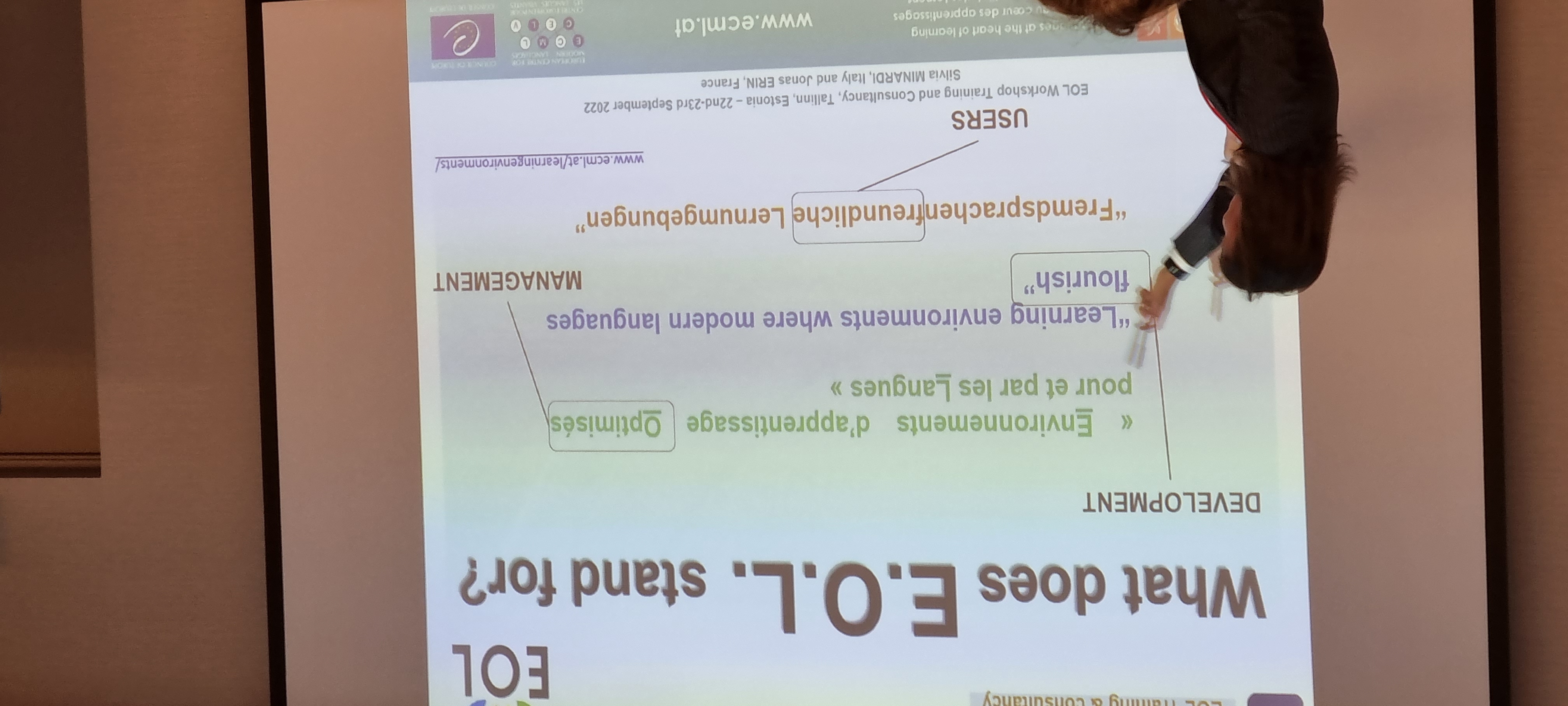
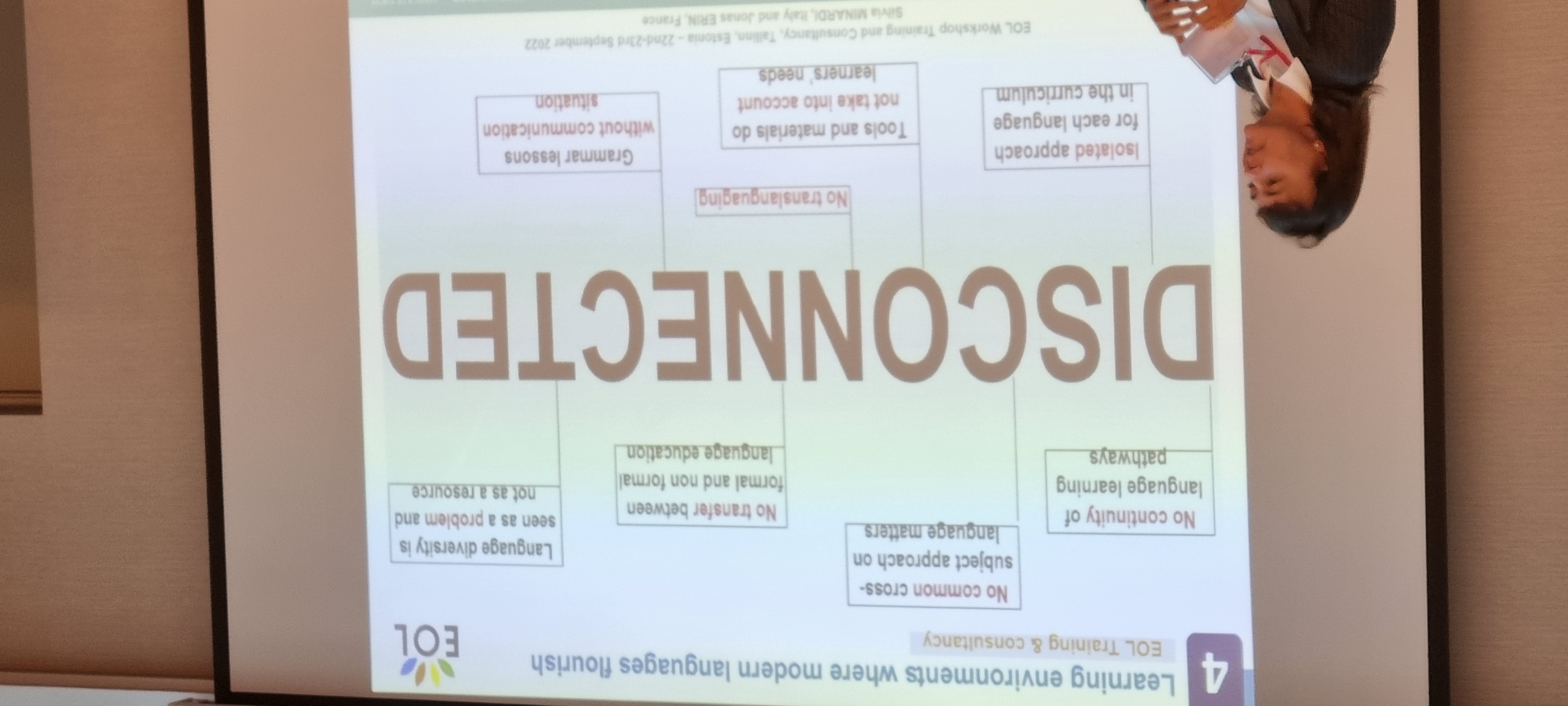
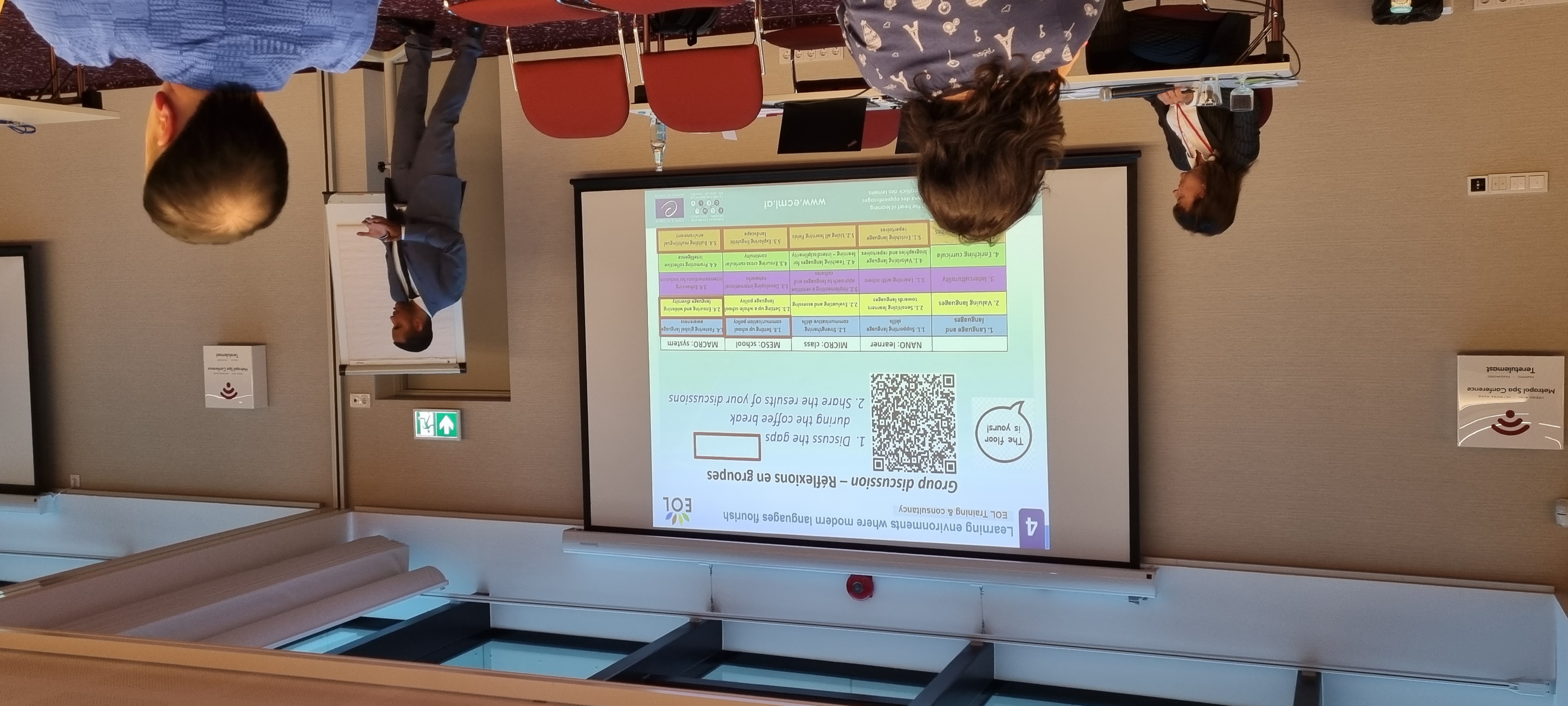
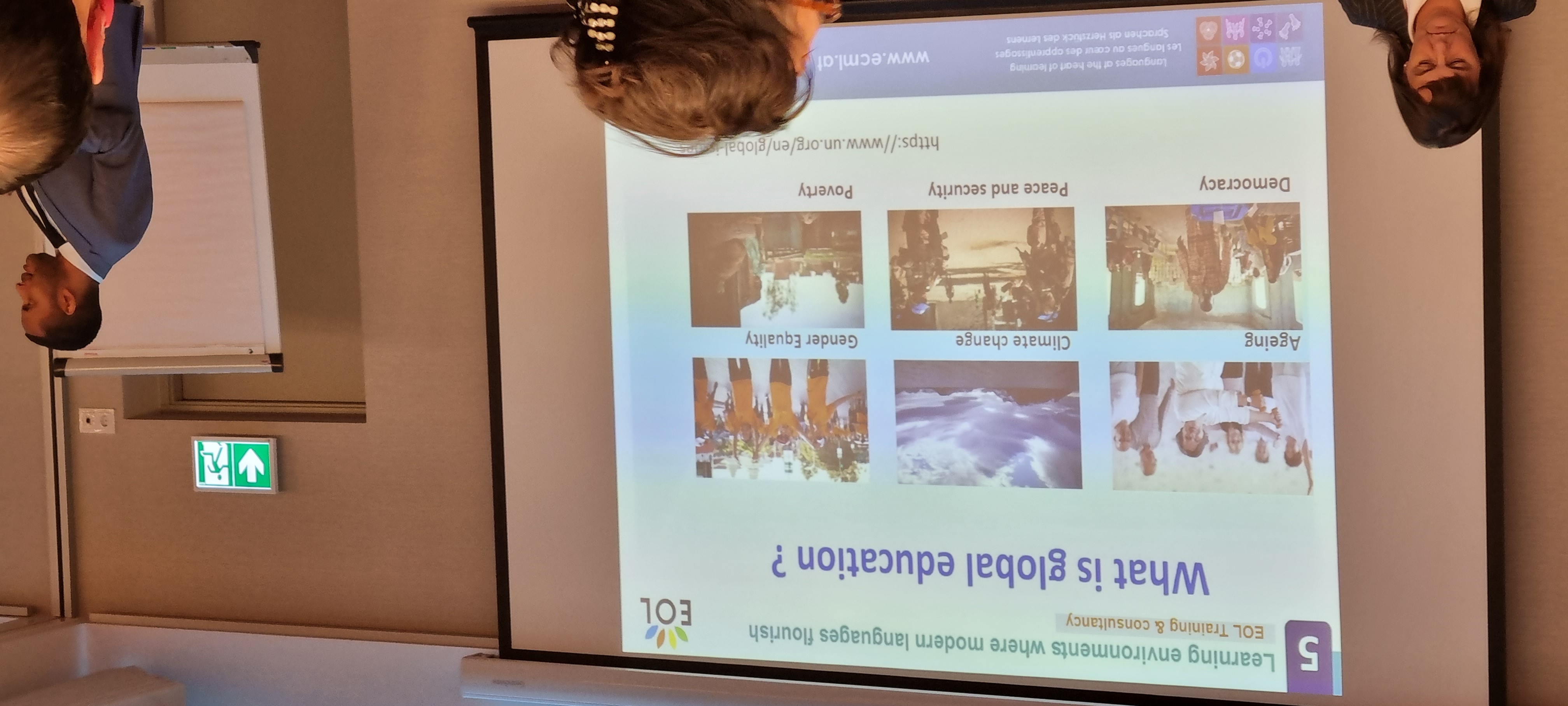
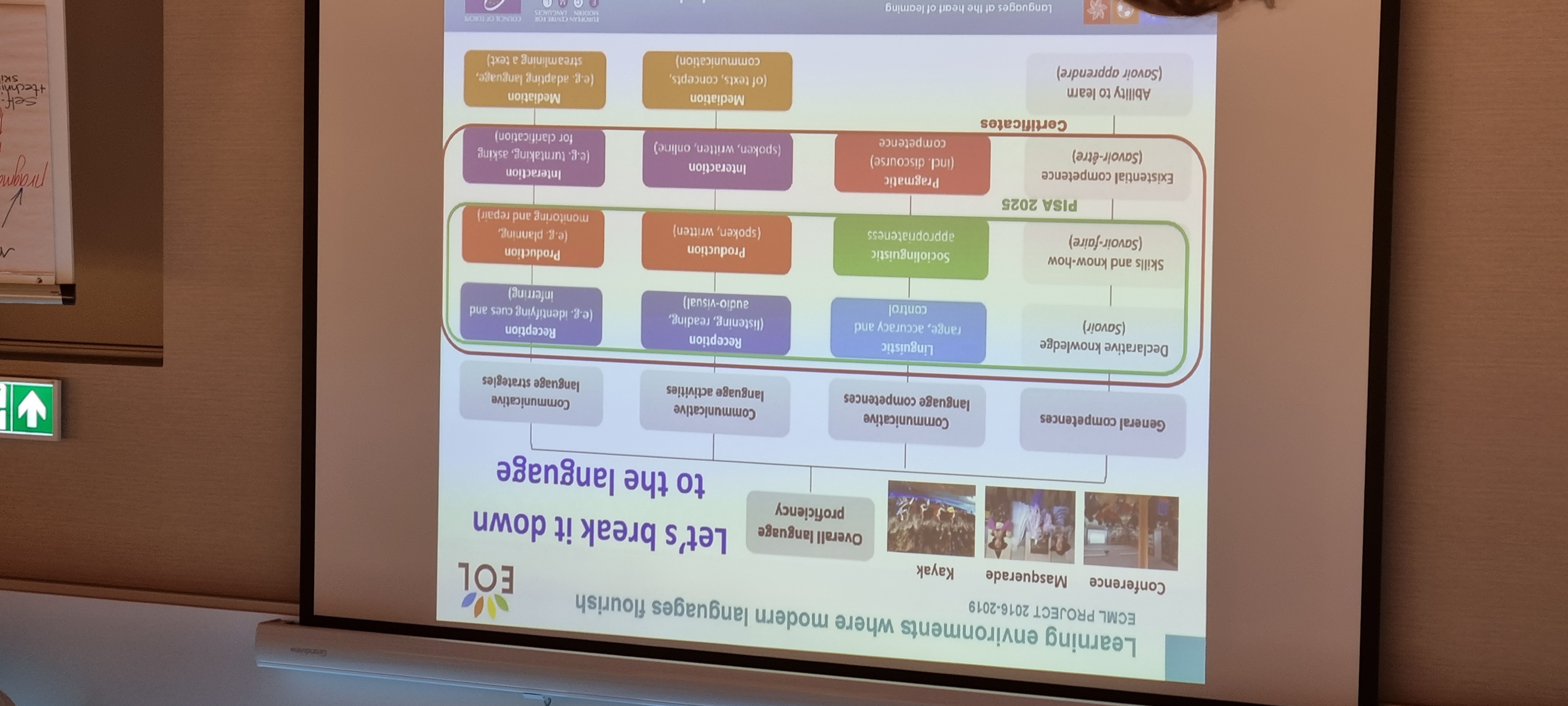
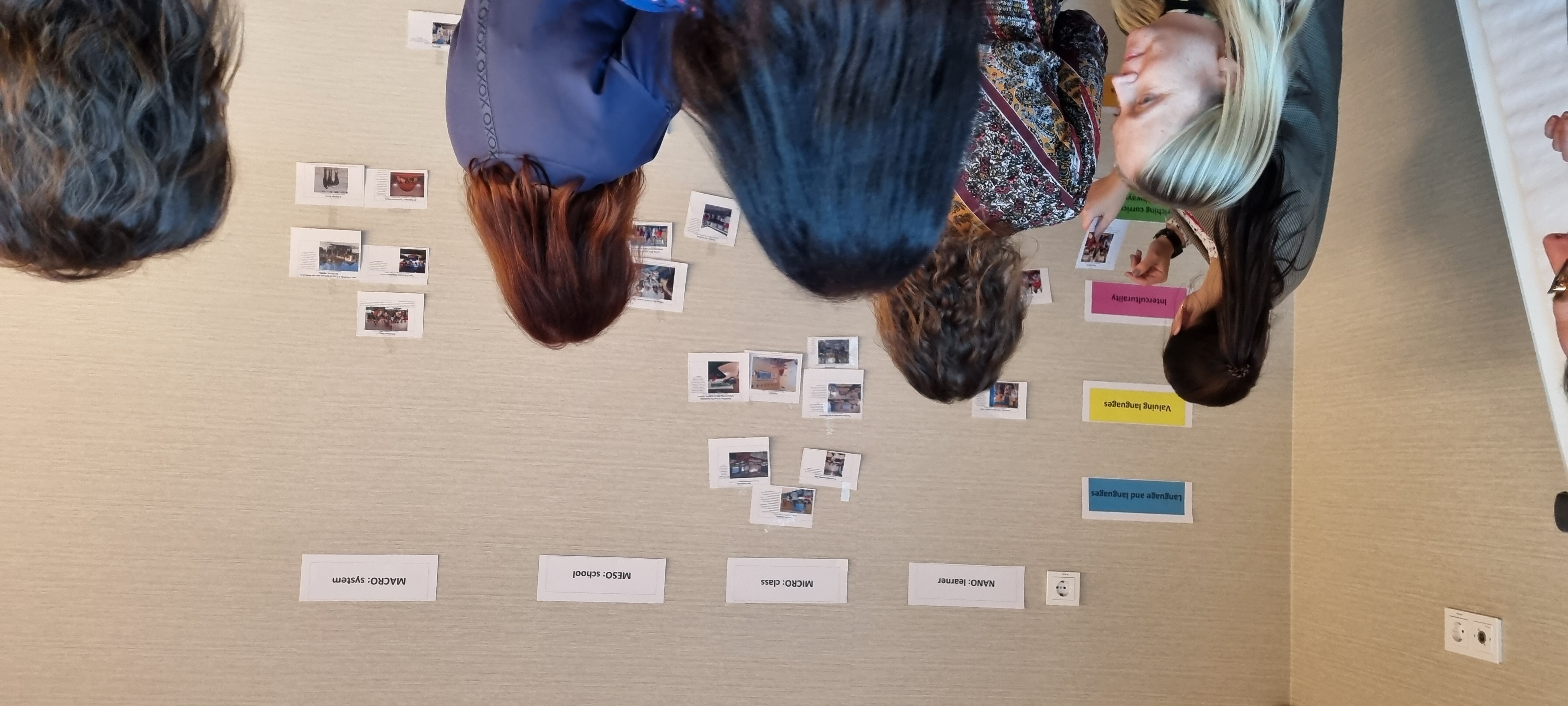
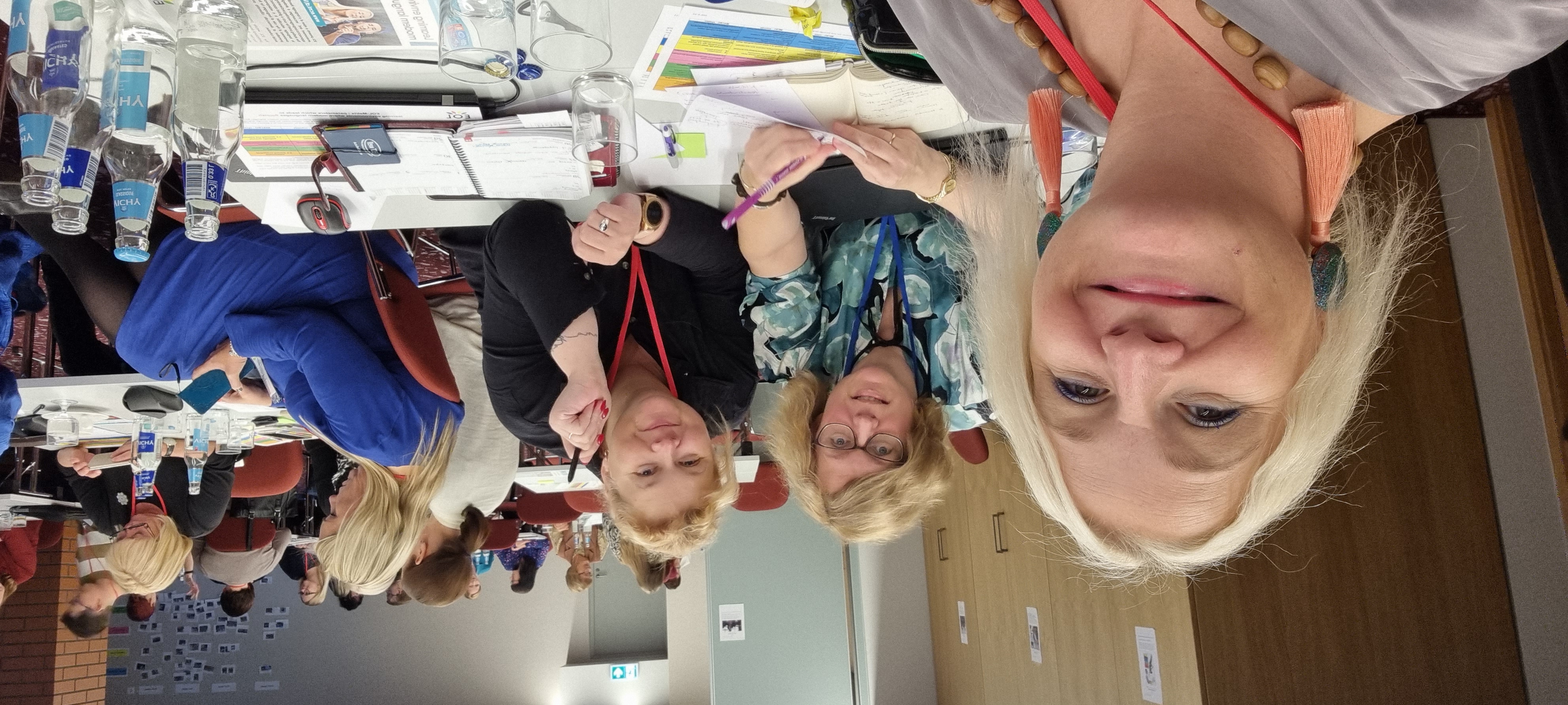
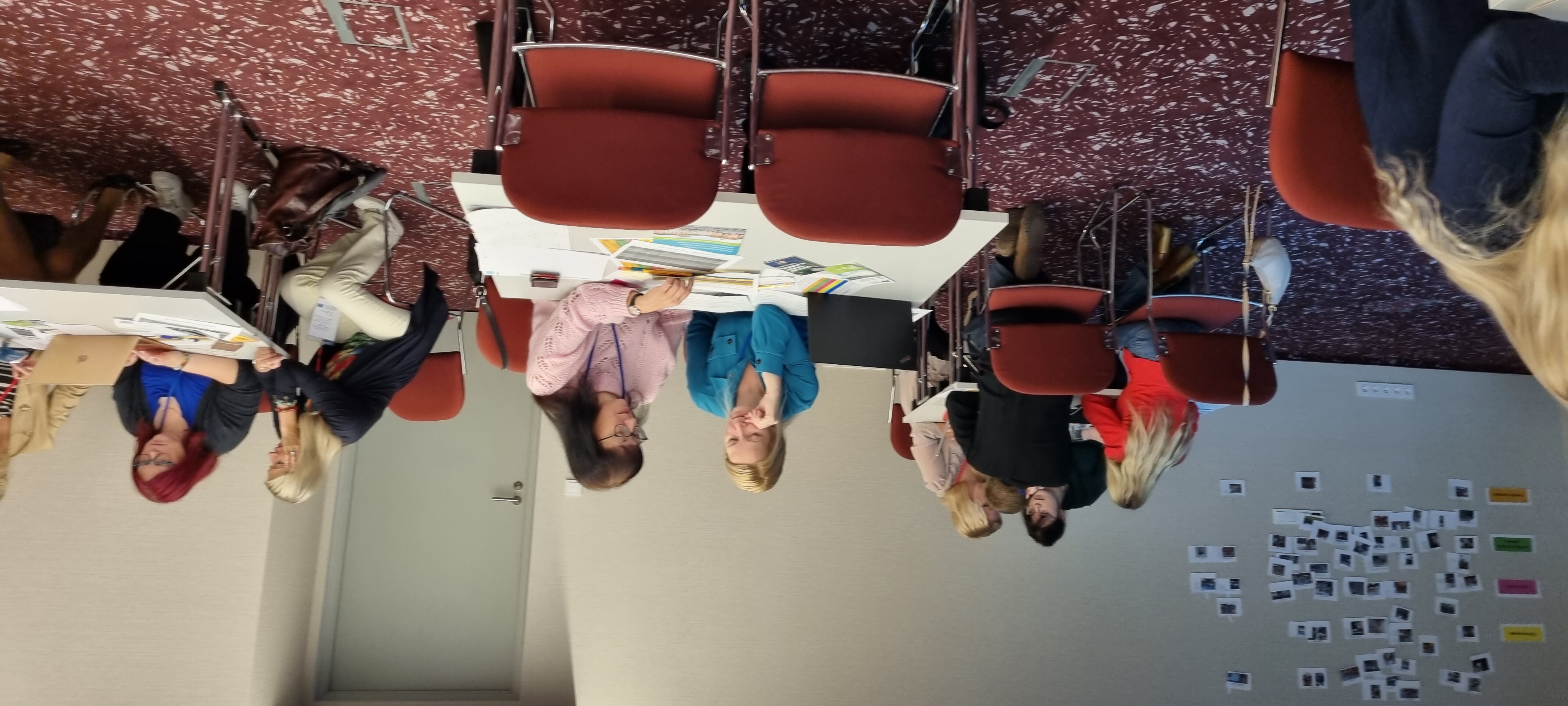

20.10.2022
National training workshop "Supporting Multilingual Classrooms" (13 – 14 October 2022, Tallinn, Estonia)
Local organiser: Kati Bakradze, Tallinn Co-Educational School
ECML experts: Brigitte Gerber, Switzerland; Terry Lamb, United Kingdom
Participants: 35 (Foreign language teachers/teachers of other subjects/teacher educators, policymakers, school administrators / leaders / school advisers)
"Supporting Multilingual Classrooms is an excellent workshop for countries where foreign language teachers face the need to become more efficient in teaching and supporting multiple foreign languages throughout the school curricula and across different subjects. The main aims for the teachers were met while compiling support materials and methods for students’ linguistic development in their classes not only teaching English or other foreign languages.
Moreover, examples and guidance of various aspects of how to be aware of valuing and supporting the students’ home languages were shared. The workshop gave insights and practical input for teachers valuing and considering the full range of students’ linguistic repertoires; being aware of students’ linguistic needs in order to be successful in their studies.
The workshop included activities which raised teachers' confidence in their ability to support students' linguistic development and their ability to also be considerate of home languages. The acute need in schools and for teachers of all subjects was the need for tools and skills to support these and all other students who have entered the Estonian educational system. All the aspects were covered including students' own cultural and linguistic backgrounds being respected and supported in the process. The participants benefitted from high level of input in making the issue of language learning a joint effort on the whole school level."
Kati Bakradze, local organiser, 18 October 2022
ECML project website: RELANG – EU-ECML cooperation agreement 2022 "Innovative methodologies and assessment in language learning"
22.02.2022
“Estonian Language Strategy 2021-2035” now available in English
The “Estonian Language Strategy 2021-2035” focuses on developing and strengthening Estonian but also sets strategic goals for foreign language learning. It addresses language policy challenges in three broad areas: status and prestige of Estonian; language technology and infrastructure; and the learning and teaching of languages. The strategy works in unison with the “Education Strategy 2021-2035” and other national strategic documents to enable people to fulfil their potential and contribute to the development of Estonia and global sustainability.
Contact information:
Pille Põiklik, Chief Expert, Language Policy Department, Estonian Ministry of Education and Research, Munga 18, 50088 Tartu, Estonia | E-mail
ECML web pages dedicated to Estonia
21.04.2020
Relating language curricula, tests and examinations to the Common European Framework of Reference (RELANG): ECML national training workshop (5 - 7 March, Tartu, Estonia)
Local organiser: Kati Bakradze, Estonian Association of Foreign Language Teachers
ECML experts: José Noijons, the Netherlands; Gábor Szabó, Hungary
Participants: 27 (language testers and examiners, item writers, teachers and teacher trainers, curriculum developers, policymakers and decision-takers)
Programme
A three-day RELANG training event, was offered by the European Centre for Modern Languages of the Council of Europe in cooperation with the Estonian Ministry of Education and Research and the Estonian Foreign Language Teachers’ Association, and co-funded by the European Commission. The workshop module “Exploring ways to test mediation and pluricultural/plurilingual skills in the classroom” brought together teachers of foreign languages, university lecturers, teacher trainers, decision makers and other experts in language education. Participants worked with mediation and pluricultural and plurilingual scales in the CEFR Companion Volume and the nuances of the Estonian national curricula. After familiarising themselves with the documents and scales, participants constructed mediation and pluricultural/plurilingual tasks as well as developed assessment grids for them. This is an important addition to the process of language acquisition as well as assessment (both summative and formative), and the workshop helped the participants in introducing the concept of mediation to the Estonian context.
Kati Bakradze, local organiser, 11 March 2020
ECML project website: RELANG – EU-ECML cooperation agreement 2019-2020 "Innovative methodologies and assessment in language learning"
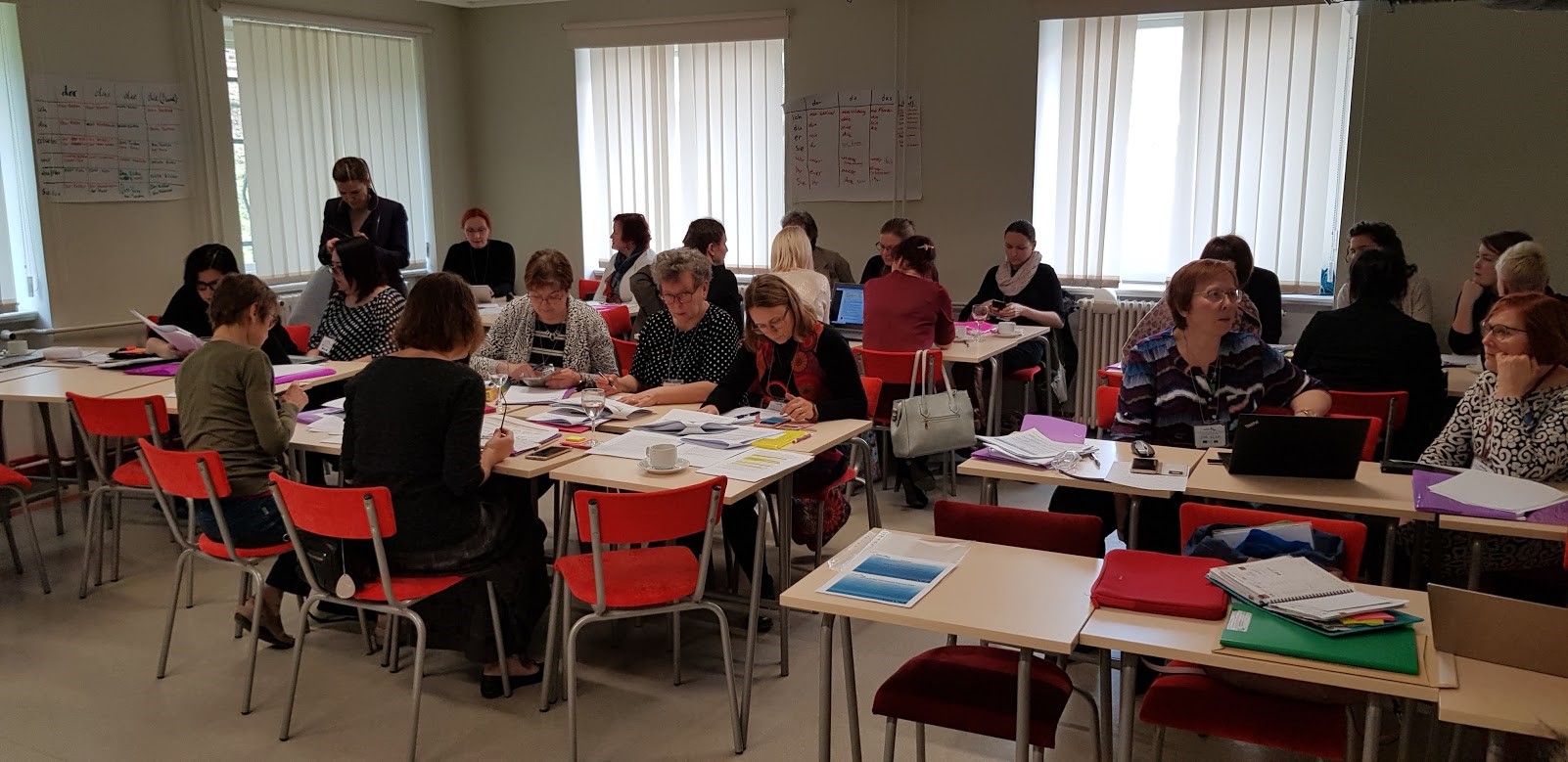

23.03.2020
PluriMobil workshop - Plurilingual and intercultural learning through mobility (Tallinn, Estonia, 6-7 February 2020)
Date: 6-7 February 2020
Venue: Tallinn, Toompuiestee 27 (Park Inn by Radisson Meriton Conference Centre)
Local organisation: Pille Põiklik, Chief expert, Language Policy Department, Ministry of Education and Research
ECML experts: Kristin Brogan, Chantal Müller
23 participants: 4 teacher trainers (including university and educational agency colleagues) ; 19 teachers (including 2 Finnish colleagues and 6 teachers from CertiLingua schools). Most participants teach either at upper secondary or basic school and upper secondary level (general education).
Teachers’ Associations representatives: 2 (also counted as teachers).
The PluriMobil workshop in Tallinn brought together teachers, teacher trainers and people involved in internationalisation to work with possibilities to support students before, during and after mobility. Participants learnt about and discussed the need to support students throughout their mobility arcs, paying special attention to the reflection that should occur after mobility periods. The competence of intercultural communication will be easier to develop if this is done through conscious and structured activities, providing students with the concepts and vocabulary necessary to record and later reflect on their experiences. Participants got to know the PluriMobil materials for different educational levels and practiced adapting them further and designing their own mobility scenarios for their own
contexts.
ESTONIAN
Tallinnas aset leidnud PluriMobilikoolitusel osalesid õpetajad, õpetajate koolitajad, ülikoolide esindajad ja
teised spetsialistid, kelle töö sisaldab õppijate toetamist mobiilsuse eel, ajal ja järel. Kultuuridevahelise suhtluse pädevus vajab teadlikku arendamist ja selleks on vajalik mobiilsuse mõtestamine enne visiite/kontakte, nende ajal,
aga kindlasti ka pärast neid. Koolitusel arutati, kuidas aidata õppijatel arendada teadmisi ja ka sõnavara, mis võimaldaksid neil oma kogemusi jooksvalt kajastada ja neist ka hiljem rääkida ja kirjutada. Osalejad tutvusid PluriMobili õppematerjalidega, mis on välja töötatud erinevatele haridusastmetele. Koolitusel osalejad mugandasid neid materjale enda kontekstile ja enda õpilaste vajadustele vastavalt.
Related ECML resources
- Plurilingual and intercultural learning through mobility – Practical resources for teachers and teacher trainers: https://plurimobil.ecml.at/
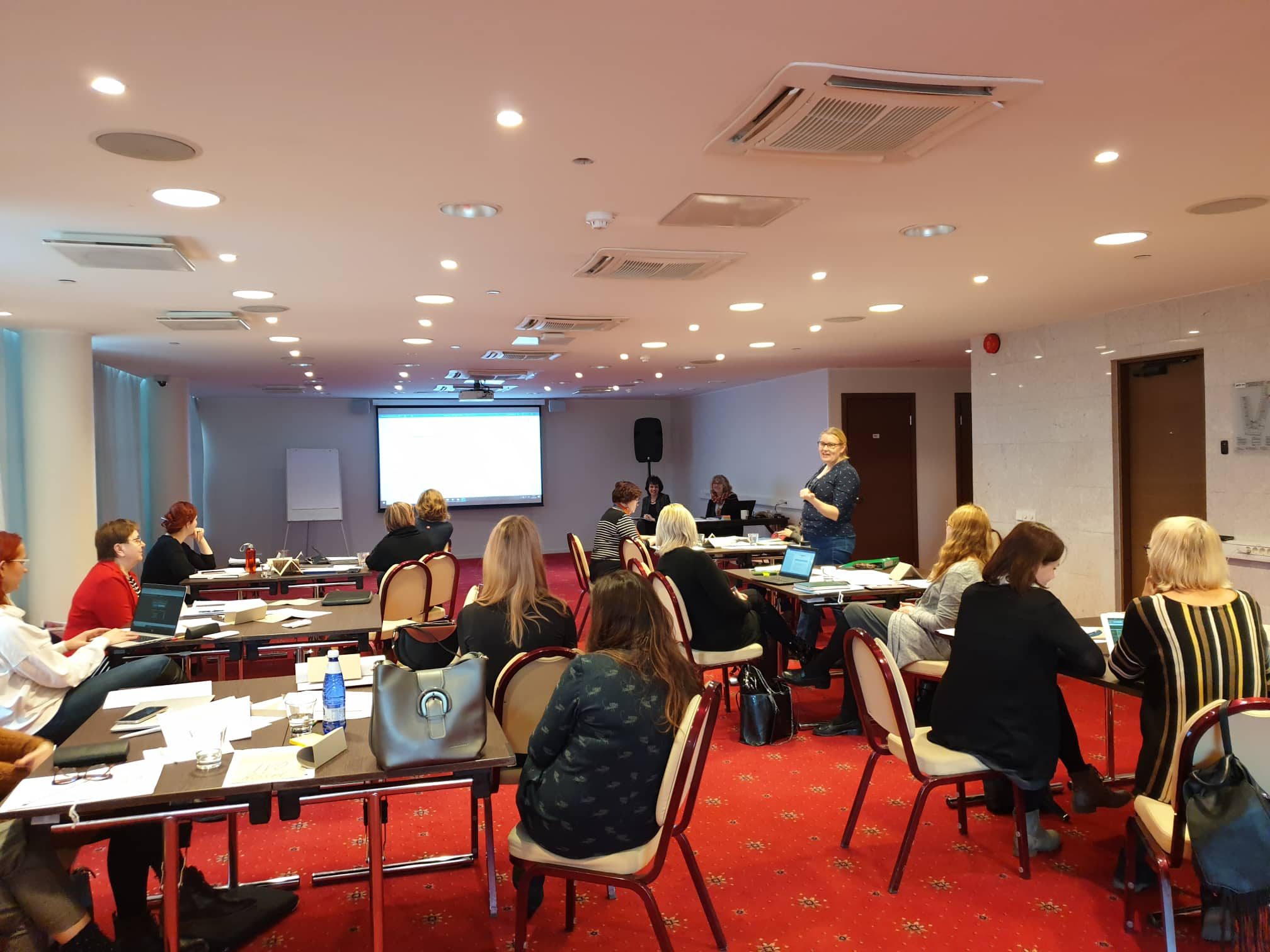

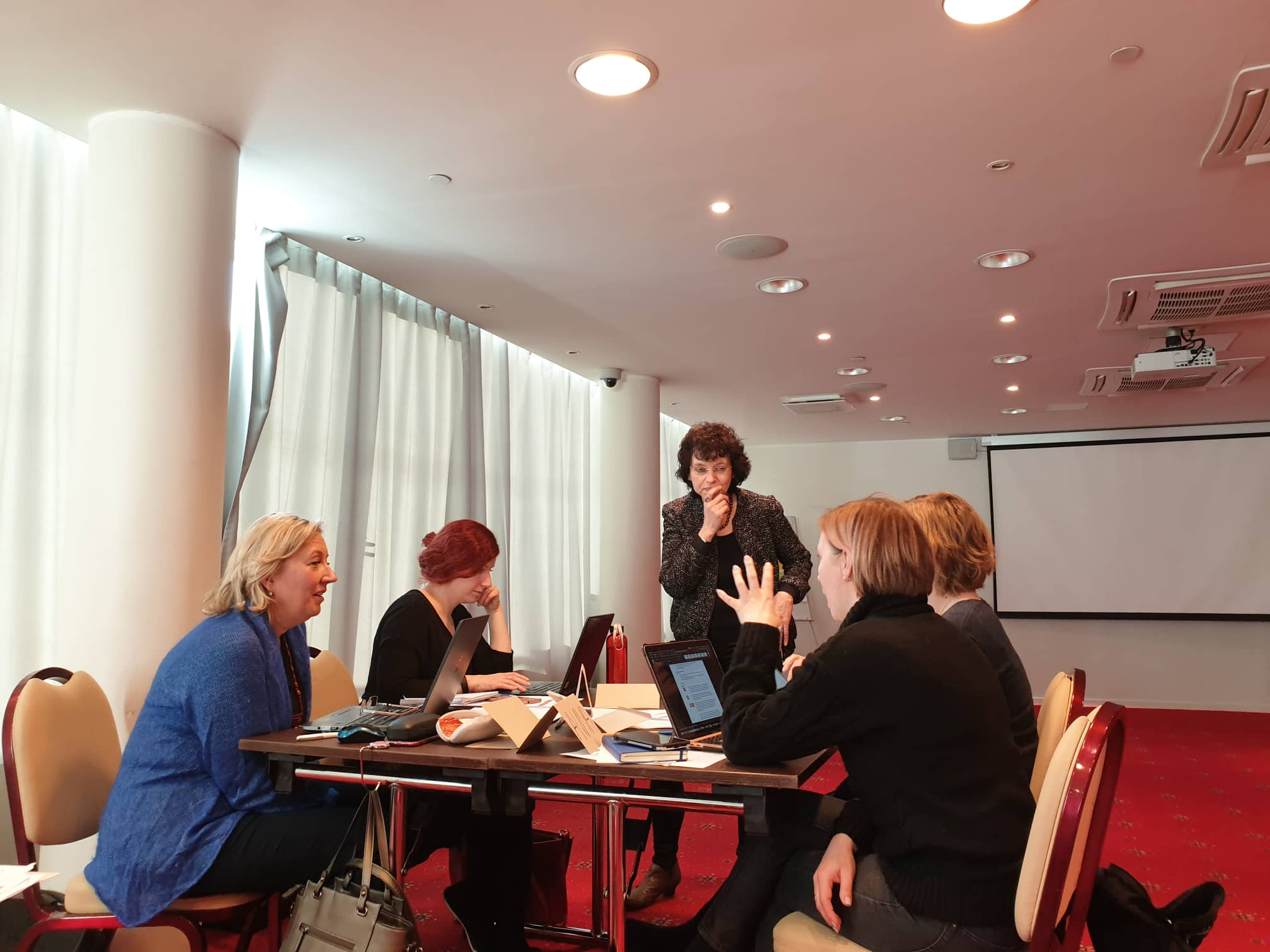
© Photos: Pille Põiklik
03.06.2019
Celebrating 100 years of Estonian as a state language
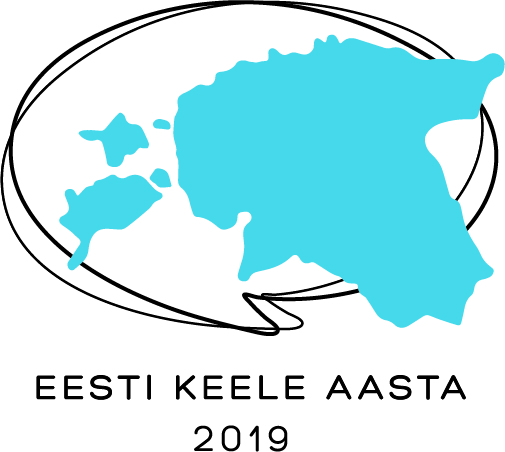 2019 marks the passing of a century since Estonian was first mentioned as a state language in the newly established republic. In celebration of this milestone, the Estonian Ministry of Education and Research has declared 2019 the Year of the Estonian Language. Throughout the year, events are organised highlighting key areas and issues related to Estonian. Each month in 2019 focuses on one such area.
2019 marks the passing of a century since Estonian was first mentioned as a state language in the newly established republic. In celebration of this milestone, the Estonian Ministry of Education and Research has declared 2019 the Year of the Estonian Language. Throughout the year, events are organised highlighting key areas and issues related to Estonian. Each month in 2019 focuses on one such area.
Months for Estonian as a mother tongue, for literature and linguistics have already been celebrated. In February, the focus was on well-written and clear texts in the public domain. May was dedicated to terminology, June is the month for language status and prestige, July is marked by the Estonian Song Festival. September will be the month of language studies and of translators, amplifying the celebration of the European Day of Languages as well as the International Translation Day. There will be time at the end of the year for topics such as reading and games, language technology and Estonian-language education.
Events are recorded (and regularly added to) on the website of the Institute of the Estonian Language.
Pille Põiklik, Chief expert,
Language Policy Department, Ministry of Education and Research of Estonia